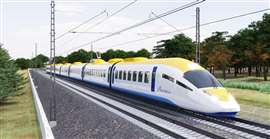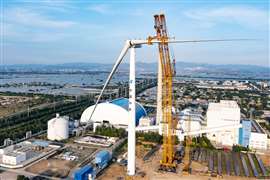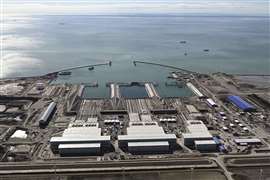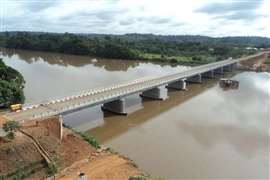Rail Baltica receives extra €1.2 billion in EU funding to keep construction on track
18 July 2024
The Rail Baltica project to build a railway across the Baltic states of Latvia, Lituania and Estonia has received an extra €1.2 billion in funding from the European Union to keep construction on track.
 Digital render of a Rail Baltica train (Image: Rail Baltica)
Digital render of a Rail Baltica train (Image: Rail Baltica)
The first phase of the project, which involves building a line to connect the three Baltic states to Poland by 2030, is expected to cost €15.3 billion.
This week, Rail Baltica joint venture RB Rail announced that it had secured an additional €1.2 billion from the Connecting Europe Facility (CEF). National financing from the three Baltic states will take the total to €1.5 billion, which Rail Baltica said would enable the progression of construction on the project (details below).
Funding for implementing Rail Baltica activities within each country from the CEF includes approximately €370 million for activity in Estonia, €346 million in Latvia, and €458 million in Lithuania.
The financing approved will be added to the existing funding of over €2.6 billion secured from the CEF and the three Baltic States.
Director-General for mobility and transport at the European Commission Magda Kopczynska said, “RB Rail submitted very strong proposals, and I am extremely pleased that after a rigorous and highly competitive selection process we can allocate €1.2 billion to Rail Baltica. This underlines our strong support for the project. Estonia, Latvia and Lithuania must be better connected to the rest of the EU; the war in Ukraine has demonstrated how important that is. I count on the project partners to make the most of the support and get this connection in place as swiftly as possible.”
The construction work the funding will accelerate
In Estonia, financing is granted for mainline construction activities, particularly substructure works for various sections, including the Soodevahe – Kangru, Kangru – Saku, County Harjumaa (including the Lagedi traffic junction/viaduct), and the Hagudi – Alu sections. Additional mainline construction includes the Saku – Harju/Rapla border section and the Alu – Kärpla section. In total, Estonia is set to receive financing for up to 55 km of the mainline.
In Latvia, the focus is on the Misa – LV/LT border section, a priority for mainline construction set to begin in the coming months, covering approximately 27 km, as well as the relocation of the natural gas pipeline in the Vangaži-Misa section. Additional funding is allocated for partial supervision services and construction assessments, as well as the Iecava High-Voltage Connection Point and the Skulte construction facility, which will serve as a construction logistics base for Latvia’s northern section of the mainline towards Estonia.
In Lithuania, co-financing has been granted for mainline construction, with a focus on substructure works for the Ramygala – Berciunai and Berciunai – Joniskelis sections on the Ramygala-LT/LV state border, high-voltage connection points at Panevėžys, Išorai, and Liudvinavas Rail Baltica traction substations, and mainline construction on the Kaunas – Seta section of the Kaunas – Ramygala line superstructure. In total, with the current funding, Lithuania will have secured founds for 114 km of substructure works for Kaunas-Lithuania/Latvia state border line and other activities.
Additionally, funding is granted for the design of Rail Baltica’s electrification subsystems and multiple Railway System Generic Designs.
In 2024, the Rail Baltica project has progressed into its next implementation phase, with around 15% of the Rail Baltica mainline expected to be under construction by the year’s end.






